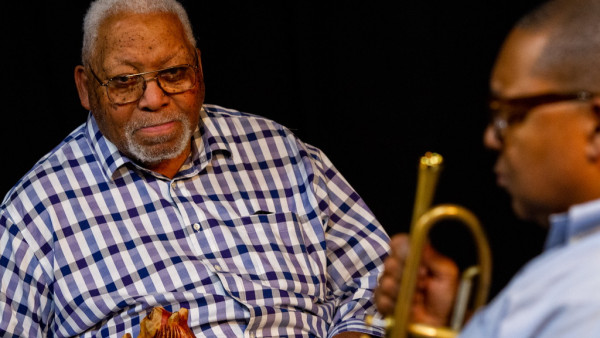Wynton Marsalis happened to have an ideal role model in his father, the pianist Ellis Marsalis
How Wynton Marsalis, keeps his head screwed on straight is beyond me. Such lavish and sustained praise has been aimed at this fine young trumpeter from New Orleans over the last few months that I cannot conceive of any 20-year-old, even one as obviously whole and motivated and self-disciplined as Marsalis, not being affected in a darkly deleterious way.
“Virtuoso technique, passion. intellect, curiosity, a sense of history, and enough humility … to guarantee that he will continue to work hard and self-critically at his craft”
–– Stanley Crouch.
“Classically trained, disciplined, with a large, warm tone and a sense of phrase shape and placement rare; these days in one his age”
–– Richard Sudhalter.
“BEWILDERINGLY MATURE” … HIS MATURITY AND CREATIVITY MAKE ONE WONDER WHAT NEW AVENUES HE WILL FIND IN WHAT WILL UNQUESTIONABLY BE A FORMIDABLE CAREER.”
–– Leonard Feather.
“The most remarkable musician to appear on the scene in quite some time. He is intelligent, witty, studious, down-to-earth, and incredible player.”
–– Ron Carters.
To judge from the subject’s first record as leader, a Columbia disc titled, sensibly enough, “Wynton Marsalis,” he is indeed a very special property… He has all of the tools – and then some. I am impressed.
Though he can be a bit overfastidious, that’s no worry now. The album, by the way, has sold some 30,000 copies in two months and certainly merits the action.
Enough. Marsalis will be bringing his new quintet to Ripley’s on Wednesday evening (8:30 and 11, admission $8). Each one of you may then write your own encomium in a little blue book.
I PHONED young Marsalis in New York the other day in an attempt to determine what makes him so interesting to so many. I caught him just after a rehearsal at precisely 10 minutes after the noon hour and I am sure he appreciated having me for lunch.
No, he said, his group is not molded in the Jazz Messengers image (he played for a spell with Art Blakey, as well as Herbie Hancock); “It’s closer to Miles’ 60s stuff or early Ornette Coleman. The concept on soloing is the same. We play our own material, one tune by Ornette, one Wayne Shorter tune. We play-standards, do them our way – a well-rounded program.”
Was the great ink he was getting in any way coincidental with the promotional aspects of his CBS records contract?
“Sure, it’s not coincidental. I know all of these guys [the writers] just from playing with different people. We’ll talk or something but they never wrote anything [about me] before.
I said I’d read somewhere about his having pursued the trumpet classically before taking-up jazz. Utterly incorrect, he said. “I started on the trumpet 14 years ago and it was not classical training. I wasn’t serious about playing at first, like a kid going to school and not wanting to learn – you understand?
In high school I became serious and I started listening to classical music. In jazz, in my teens, I listened mostly, to Clifford and Trane and Clark Terry.”
MARSALIS was such a quick study on the legit side that at 14 he won a citywide competition and the opportunity to play the Haydn Trumpet Concerto with the New Orleans Philharmonic. At 18 he entered the Juilliard School, studied there for two years, (his trumpet teacher was William Vacchiano, who also coached Miles at Juilliard), dropped out to play professionally. He says he plans to pick op again at Juilliard next year.
“I was always academic-minded – I went to a school that was almost all white and I didn’t want the white kids to think I was dumb. I didn’t want to be a doctor or a lawyer: jazz is what I wanted. Jazz is the only thing for black kids growing up – they have no positive role models. The record covers had [photos of] Clifford Brown and other black musicians and I wanted to be one of them. They all seemed like intelligent men to me.”
Marsalis happened to have an ideal role model in his father, the pianist Ellis Marsalis. Wynton and his older brother Branford, who plays tenor saxophone in the quintet, went on jobs with their father early on.
“I could see what was happening from my father’s situation. All of my life I’ve been trying to get around condescension – that’s the way the music is treated, and the whole second-class black situation in America, and I’m tired of it. I’m proud of this music. It requires intellect and everything else but the American people, are just overlooking this art form because it was mainly black people who perpetrated it. And that’s blatant b.s.”
MARSALIS acknowledged to a Chicago writer not long ago that playing jazz was a “no-win” proposition. “For one thing, the black people don’t support you … black people just aren’t being educated about jazz.”
And: “There’s no reason jazz musicians should be making as much money as pop musicians because they don’t generate that kind of revenue.
Jazz is a music that makes you feel and think, which is why we’ll never have a large audience. But the audience should be larger than it is.”
Age-old verities. Why, then, does the incredible Wynton Marsalis insist on doing his classy backstroke in this bouillabaisse of tears called jazz? I could feel the impatience clawing at his hairline as I spoke.
“I’m young,” he grated, “and all I have is myself, and I’m not going to miss the money because I never had it. I care about playing good music now – and I hope I never change.”
At that moment I ceased worrying about the cant of Wynton’s upper story.
by Nels Nelson
Source: Philadelphia Daily News

